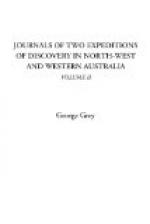The season of the year in which the natives catch the greatest quantity of frogs and freshwater shellfish is when the swamps are nearly dried up; these animals then bury themselves in holes in the mud, and the native women with their long sticks and long thin arms, which they plunge up to the shoulder in the slime, manage to drag them out; at all seasons however they catch some of these animals, but in summer a whole troop of native women may be seen paddling about in a swamp, slapping themselves to kill the mosquitoes and sandflies, and every now and then plunging their arms down into the mud, and dragging forth their prey. I have often seen them with ten or twelve pounds weight of frogs in their bag.
Frogs are cooked on a slow fire of wood ashes. They are then held in one hand by the hind legs, and a dexterous pinch with the finger and thumb of the other at once removes the lower portion of the intestines. The remainder of the animal is then taken at a mouthful and fairly eaten from the head to the toes.
The freshwater shellfish vary in size from that of a prawn to a large crayfish; the smallest are the best, and when nicely roasted there is no difference in taste between them and a shrimp. It is worthy of remark that the natives in the south-western part of Australia will not touch freshwater mussels, which are very abundant in the rivers, whilst in the north-western part of the continent they form a staple article of food.
GRUBS AND WALLABIES.
Grubs are principally procured by the natives from the Xanthorrhoea or grass-tree, but they are also found in wattle-trees, and in dead timber; those found in the grass-tree have a fragrant aromatic flavour and taste very like a nice nut. Their presence in a tree is thus ascertained: if the top of the tree is observed to be dead the native gives it a few sharp kicks with his foot, when, if it contains any barde or grubs, it begins to give, and if this takes place he pushes the tree over, and, gradually breaking it to pieces with his hammer, he extracts the grubs, of which sometimes more than a hundred are found in a single tree.
Until the top of the tree is dead it is not a proper receptacle for these animals. The natives are therefore in the habit of breaking off the tops of the grass-trees on their land at a particular season of the year in order that they may have an abundance of this highly-prized article of food. If two or more men have a right to hunt over the same portion of ground, and one of them breaks off the tops of certain trees, by their laws the grubs in these are his property and no one else has a right to touch the tree. No mistake on this point can occur, for if the top of the tree dies naturally it still remains in its original position, whereas a native who thus prepares the tree knocks it off altogether; an instance occurred at King George’s Sound of a native travelling between thirty and forty miles to lay a complaint before the Resident that another had been guilty of this unpardonable breach of honesty, and, notwithstanding it had been clearly brought home to him, still stoutly refused to make any amends.




